A Conversation With James Clemens
by Claire E. White
Mystery thriller fans know him as James Rollins, the New York Times
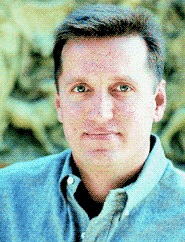
|
Born in Chicago, Illinois, in 1961, Jim was raised in the Midwest and rural Canada with his three brothers and three sisters. As a child he explored cornfields, tadpoles, and frozen ponds, dreaming of worlds and adventures beyond the next bend in the creek. Always a storyteller by nature, he would regale his siblings with fantastic (and scary) stories on many subjects.
Eventually, forced to grow up, he went to school at the University of Missouri, where he graduated with an undergraduate focus on evolutionary biology and a doctorate in veterinary medicine in 1985.
During one especially icy Midwestern winter, the lure of ocean, sun, and new horizons eventually drew him to the West Coast where he established his veterinary practice in Sacramento, California. Presently, he shares his home with two Dalmatians, a stray Shepherd, and a love-sick parrot named Igor.
His latest book is an exciting thriller entitled Excavation (HarperTorch). Excavation was inspired by James' fascination as a boy with the adventures of how Howard Carter discovered the golden tomb of King Tut. The true story was an exciting tale, filled with intrigue, treachery, and a hint of an ancient Egyptian curse. As he read, he dreamed of following in Howard Carter's footsteps. And then, at least in his imagination, James was given the chance to do just that. The novel opens in the heart of the Andean jungles, among long-lost ruins in a temple sealed with a dying priest's last words. The story follows the adventures of archaeologist, Henry Conklin, and his nephew Sam, who discover an unknown Inca city high in the Andean mountains. Like the story of Howard Carter, Henry's adventure is filled with danger, lost treasure and a hidden curse -- but in Henry's case, the curse threatens not just his archaeological team, but all of mankind.
An amateur spelunker and scuba diver, James will often be found either underground or underwater -- when he's not working, that is. He spoke with us about his latest books, Excavation and Wit'ch War, how he got his start as an author, and what aspiring writers must learn to do if they want to get published.
What did you like to read when you were growing up?
Though I read quite a variety of material, I certainly had a preference to stories with fantastic bent to them: Tarzan novels by Edgar Rice Burroughs, Frank Baum's Oz novels, Lewis's Narnia books, the old Doc Savage adventure pulps, and lots of classics in the science fiction/fantasy genre.
When did you first know that wanted to be a novelist?
I'd say almost after reading my first book I knew I wanted to spin tales. I remember as a young boy terrorizing my brothers and sisters with strange and horrific stories: Fanciful tales of what lurked in the nearby woods, frightening stories of how the ventriloquist doll in the closet came alive at night looking for blood, anything to scare them witless.
What led to the publication of your first book?
That was an interesting and sudden experience.
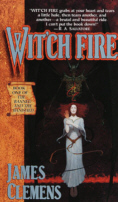
|
So as Labor Day rolled around, I packed up my bags and dreams, and headed for the sunny shores of Maui. On the first day of the conference, at a meet-and-greet cocktail party, I spotted one of my idols: Terry Brooks, international bestselling author of the Shannara fantasy series. I approached him and thanked him for writing such wonderful novels.
He, in turn, glanced to my nametag and said. "Oh, I'm a fan of yours, too."
I didn't know what Terry Brooks was talking about, so I just laughed nervously as if I understood his joke (because that's what you do when you meet one of your childhood idols).
He responded matter-of-factly, "No, I'm serious. I was one of the judges for this year's contest. And here's my publisher. He'd like to talk to you."
From that meeting, a three-book deal for my fantasy series was eventually struck. In that single weekend, my life changed.
Let's talk about the "Banned and the Banished" series. What inspired you to write this series?
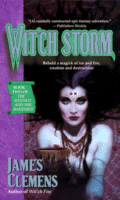
|
The plotting in this series is quite complex. Do you use outlines when you write? Did you know the ending of the series when you wrote the first book?
To manage a plot twisting across five novels, some outline was necessary to keep from getting totally lost. Before beginning the first novel, Wit'ch Fire, I outlined where each novel would end, how much Elena would mature in spirit and magick, and ultimately how the series would end -- but the remainder of the details I left vague and open. Working from a pretty loose outline allowed my characters to somewhat dictate where the story would flow. It is what I like best about writing - going on the journey with them, discovering surprises and twists, learning more and more about my characters, seeing them come to life with a will and voice of their own.
The heroine of this series is the young wit'ch Elena, who is a complex and fascinating woman. How did you create Elena? Was it difficult writing from a woman's point of view?
Elena was a character developing in my mind over the course of almost five years. I had to let her grow inside me, incubating. I would jot notes about her. I would hear her voice in my head. Until she was a part of me, I could not write her. As to a woman's perspective, I grew up with three sisters, both younger and older than me. I borrowed and stole recklessly from their experiences to expand Elena's character. I also ran the first drafts of each novel past several women friends to get their opinions and viewpoints.
What was the most challenging aspect of writing this series?
| "Everyone is different. Find out what works for you and stick with it! But one rule should be followed by all novice writers: Write every day! Even if it's only a single page! Listen to those Nike ads . . . Just do it!" |
The blood magic of Elena is one of the most interesting aspects of the books. Did this premise create any special challenges in the plotting or writing of the novels?
Magic in a novel does create a few problems. You don't want the magic be so powerful that the wielder becomes omnipotent. It sabotages any suspense if the character can wriggle her nose and all her problems go away. What's the point of reading further? So in constructing Elena's magic, I knew it had to come at a price -- and that price was her own blood. Her magic had to threaten her spirit, be difficult to control, and come without any instructions. I wanted to see her grow in maturity as she grew in power, tentatively balancing the witch and woman in her soul.
How do you go about creating magic and rules for a new fantasy universe?
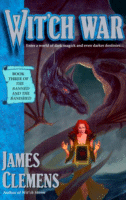
|
The relationships between Sy-wen and Kast and between Elena and Er'ril are important elements in the overall story. Did you find it difficult to integrate the romantic elements into the story?
Romance, I think, is as vital as survival. What life is worth living if it's loveless? So as the characters are faced with dangers and harrowing adventures, it is most natural to find bonds being forged that run deep to the heart. As the story unfolds, these relationships will be tested, and some will break and some will grow stronger, like tempered steel.
The Dark Lord is quite frightening, as are his visits to his hapless emissaries. But we only get tantalizing glimpses of him, the root of the evil which Elena faces. How did you approach writing evil characters of the story. Are they more or less fun to write than the heroes?
I enjoy writing on both sides of the proverbial coin. You get to play both hero and villain. When I constructed Elena's enemies, I tried to create adversaries who believed in their cause just as thoroughly as the heroes did theirs. I also tried to give them various shades of grey, some who even work at cross purposes to the Dark Lord himself. But, in truth, the ill'guard were especially fun to write -- twisted elemental souls whose depravity knows no bounds. Hmm . . . what does that say about me?
The world of Alasea is beautiful, dangerous, and complex. How did you go about creating Alasea? What do you enjoy most about world building?
What I like best is seeing the world come alive -- to see it breathe and bleed and shine. Building Alasea was a process of layering. First, its bones had to be set in stone. So a map was drawn. Then it had to be populated, and a history built atop it. Once this base was established, the final step was for specific characters to arise from these various lands and be fleshed out. After this the story could finally begin . . .
Can you give us a sneak peek into the next installment in the wit'ch series?
The next book covers the aftermath of the War of the Isles described in Wit'ch War. In this novel, Elena and her companions are forced to split up in order to pursue the secrets behind the four Weirgates. It will lead the characters to the icy mountains of north and the sun-blasted deserts of the Southern Wastes, and ultimately to the shores of Gul'gotha itself. And for those who'd like a sneak peek at the first chapter of Book Four, Wit'ch Gate, it's posted on my website: www.jamesclemens.com.
Much different in tone and focus is your work in the thriller genre. How did your latest release, Excavation, come about? What inspired you to write this story?
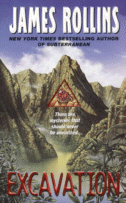
|
If you were doing the casting for a film of Excavation, who would you see in the roles of Henry, Joan, Maggie, and Sam?
Gosh, I don't know if I could answer that. These characters are so deeply ingrained in my psyche that I find it hard to imagine actors in their place. I have the same problem with most adaptations of my favorite books to film. Now that all said, I'd love to see Sean Connery play Henry. Hell, I can dream, can't I?
I liked the fact that two of the romantic leads were over 50 - their story was touching and funny. What went into your decision to have two romantic subplots, one with the older professors?
First, I wanted Henry and his nephew Sam to be wounded at the beginning of the novel. Because of tragedies in their past, they've shut out others from their lives and become inseparable. "Scarred together" is how I described them in the novel. I wanted love to tug them apart: an old love returning to Henry's life and a new one in Sam's.
One theme that seems to appear in your books is that of strong friendship and the overcoming of prejudices. Do you consciously think about themes when you plan your books?
Only very generally. I mostly write to entertain, not so much to instruct or preach. I think thematic elements come naturally if you've developed well-rounded characters. The human condition is fraught with struggles of morality, conscience, and growth. It is only natural for issues and views to shine forth in even the wildest situations.
How do you find the time to write with a busy veterinary practice?
When I wrote the first four books, I worked a 60-70 hour work week.
| "Romance, I think, is as vital as survival. What life is worth living if it's loveless?" |
I'd like to talk about the actual writing process itself. What are some of your writing routines?
I like this question. I think every writer needs to develop their "habit." I'll tell you mine, but each writer needs to find their own rituals and habits.
My first adage is that I write every day. My usual day is that I get up, yawn, stretch, and go right to my computer. I will write for about two hours, then take a break to get a bite to eat and take a shower, then I return to write for another two hours, then break for lunch, then write another two hours. So basically I work six hours in two hours shifts. But my "habit" is not set in stone. How I spread out these "shifts" varies. I often write late at night or sometimes in larger blocks. But one rule I do follow: to write every day.
As to where I write, I mostly use my office at home, but I write exclusively on a laptop Macintosh so I can grab the computer and move. I'll often shift to another place in the house if I'm feeling stuck. Or take my laptop and run off somewhere. I've often solved problems in my story by simply changing the scenery around me.
But these are just my habits. Everyone is different. Find out what works for you and stick with it! But one rule should be followed by all novice writers: Write every day! Even if it's only a single page! Listen to those Nike ads . . . Just do it!
I understand you are also a screenwriter. What projects are you working on now?
Presently I just dabble in screenwriting. I work with a partner in L.A., and we have a few irons in the fire. A couple screenplays have been optioned by various studios but nothing that has passed onto full production.
When you're not working, what do you do to relax?
I'm still a voracious reader, gobbling up book after book. I also love sneaking off to matinees with a large bucket of popcorn. On a more physical level, I do enjoy SCUBA-diving and cave exploring. You'll find many of these hobbies play a critical role in my thrillers. In the first thriller, Subterranean, I tossed five characters two miles under the Earth to explore "extreme" caving. And in the upcoming, Deep Fathom, I dealt with deep-sea exploration in order to take diving to a new level.
What is your advice to aspiring writers?
That's simple! Write a good story! Okay now the non-flippant response…
I've never had any formal training to write. I read some books, I attended a mail-order and an online course on writing. Anyone can get published. It does not take talent. But like any profession, writing takes some practice. You need to learn the tools of the craft (grammar, story construction, etc.), then keep plugging away at it. Also start studying other authors in your genre. I can't stress this any higher. The answer on how to write can be found in every novel you pick up.
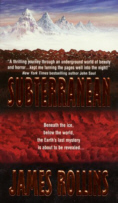
|
The name of the publishing game is persistence. Editors are looking for good stories. Write one -- and don't give up until it's published.
More from Writers Write
Stephen King Quotes
quotes from the master
quotes from the master
Grammar Tips
improve your writing
improve your writing
Writing Prompts
spark your creativity
spark your creativity
